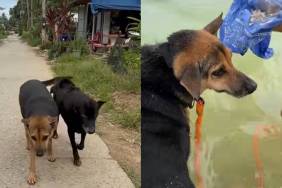Intestinal cancer in dogs is a condition caused by malignant tumors. The tumors are often found in a dog’s gastrointestinal system.
Generally, older dogs are affected by the condition more than younger dogs. Also, male dogs develop the condition more than female dogs.
Thankfully, the condition is considered to be quite rare. But unfortunately, dogs diagnosed with it often don’t fare well.
Technically, the condition is also known as adenocarcinoma in dogs.
If you see the signs of the condition in your dog, then get to a veterinarian for a proper diagnosis and treatment.
Here’s what you should know about the symptoms, causes, and treatments for the condition.
Symptoms of Intestinal Cancer in Dogs
The condition produces a number of symptoms. For instance, some of the most common symptoms include:
- Stomach pain
- Losing weight
- Vomiting
- Appetite loss
- Peritonitis
- Blood present in poop
- Problems pooping
- Black poop
Causes of Intestinal Cancer in Dogs

The cause of the condition is unfortunately unknown. However, male dogs develop the condition more often than female dogs. Also, dogs over the age of six suffer from the condition more than younger pups.
Additionally, certain breeds are predisposed to the condition. For example, German Shepherds, Collies, and Belgian Shepherds suffer from the condition more than usual.
Treatments for the Condition in Dogs
Firstly, your vet will ask about your dog’s symptoms. Secondly, your vet will ask about your dog’s full medical history. This will include breed-specific problems.
Thirdly, your vet will carry out a full physical examination. Also, your dog’s blood, urine, and poop will be tested. Additionally, ultrasounds and biopsies can be used to confirm the condition.
Generally, your dog’s treatment will involve surgery. This is to remove any tumors. Additionally, your dog can need chemotherapy in some cases.
Usually, your dog will also need to take pain medication. As always, if your vet prescribes your dog any medicine, make sure to stick to the correct dose and frequency instructions. Also, complete the full course of medicine.
Finally, while your dog is recovering at home, provide them with a quiet and calm environment. Also, your dog will need to keep up regular visits with their vet. This is to monitor how your dog’s recovery is going.
Have you ever cared for a dog who suffered from this condition? How did your vet help your dog recover? Let us know in the comments section below.









